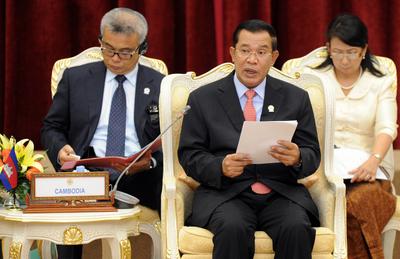The first meeting is usually held early in the year and focuses on internal ASEAN matters, such as developments in Myanmar. But this is only a matter of habit, so the summit can also be an opportunity for ASEAN to discuss its position on current global issues outside the region. The second summit of the year is usually an occasion for ASEAN leaders to meet their counterparts from ASEAN+3 (China, Japan and South Korea).
In the lead up to the April 2012 Phnom Penh summit the media ran numerous stories about China’s pressure on Cambodia to keep the South China Sea dispute off the agenda. Regardless of whether these stories reflect actual events, they demonstrate a lack of understanding about the role that agendas play in international meetings. Agendas are normally a list of the chair country’s priorities rather than an indication of what will actually be discussed, and they are often couched in very general terms. In any case, there is little that the chairperson can do if other participants raise something outside the formal agenda.
Similarly, the chairperson’s statement, which purports to record the discussions at the summit, does not necessarily reflect what is actually talked about because some points under discussion may be too sensitive for inclusion. In other cases, the parties will not have reached consensus so they agree to leave issues out of the official record.
The chairman’s statement from the Phnom Penh summit may be silent on more than one point, but it does articulate a series of issues worth considering.
One is that the ASEAN member states, all of which are signatories to the 1995 Southeast Asia Nuclear Weapon-Free Zone Treaty, have concluded their consultations on the treaty’s protocol with four of the five recognised nuclear-weapon states: Britain, France, Russia and the US. The fifth of these states, China, expressed its readiness to sign the protocol long ago, and this will link the nuclear-weapon states with the Southeast Asia nuclear weapons-free zone. The summit also encouraged ‘full’ respect for the 2006 and 2009 UN Security Council resolutions on North Korea’s nuclear tests and the ‘early resumption’ of the Six-Party Talks.
Another issue to come out of the chairman’s statement is that not all ASEAN states have ratified the third protocol to the 1976 Treaty of Amity and Cooperation in Southeast Asia, which would enable the European Union, as a non-sovereign state, to accede to the treaty. The UK has also expressed interest in following France in separately acceding to this treaty, thus raising to 18 the number of non-ASEAN states that are parties to it. By signing the treaty, parties agree to certain standards of behaviour for inter-state relations in Southeast Asia, which include rejecting the use or threat of force, the peaceful settlement of disputes and non-interference in other countries’ domestic affairs.
The chairman’s statement also revealed that ASEAN leaders still have not reached a decision on Timor-Leste’s application for ASEAN membership.
The recent elections in Myanmar were declared to have been ‘free, fair and transparent’, and ‘a significant step towards further democratization’. On these grounds, ASEAN called for ‘the lifting of all sanctions on Myanmar immediately’. The statement equally showed that ASEAN continues to see the 2002 Declaration on the Conduct of Parties in the South China Sea ‘as a milestone document signed between ASEAN and China’. But this position runs contrary to China’s stance on the matter, which opposes ASEAN’s involvement in the dispute.
Finally, some headway seems to have been made in establishing ASEAN’s continued presence at future G20 summits. In 2011, Indonesian president Susilo Bambang Yudhoyono attended the G20 summit in Cannes, both in his capacity as president of a G20 member country and as leader of ASEAN’s chair country for that year. He pushed for the institutionalisation of ASEAN’s participation in G20 summits, which would replace ad hoc invitations from the country hosting the G20 summit. The chairman’s statement from the most recent ASEAN summit indicates that Mexico has invited Prime Minister Hun Sen of Cambodia (ASEAN’s 2012 chair country) to the G20 summit in Los Cabos — an encouraging development. It also showed that ASEAN is working on a position paper detailing its views on regional and global issues, particularly the world economy and finance, which will be presented at the Los Cabos G20 summit.
Rodolfo C. Severino is Head at the ASEAN Studies Centre, Institute of Southeast Asian Studies, Singapore, and a former ASEAN secretary-general.

